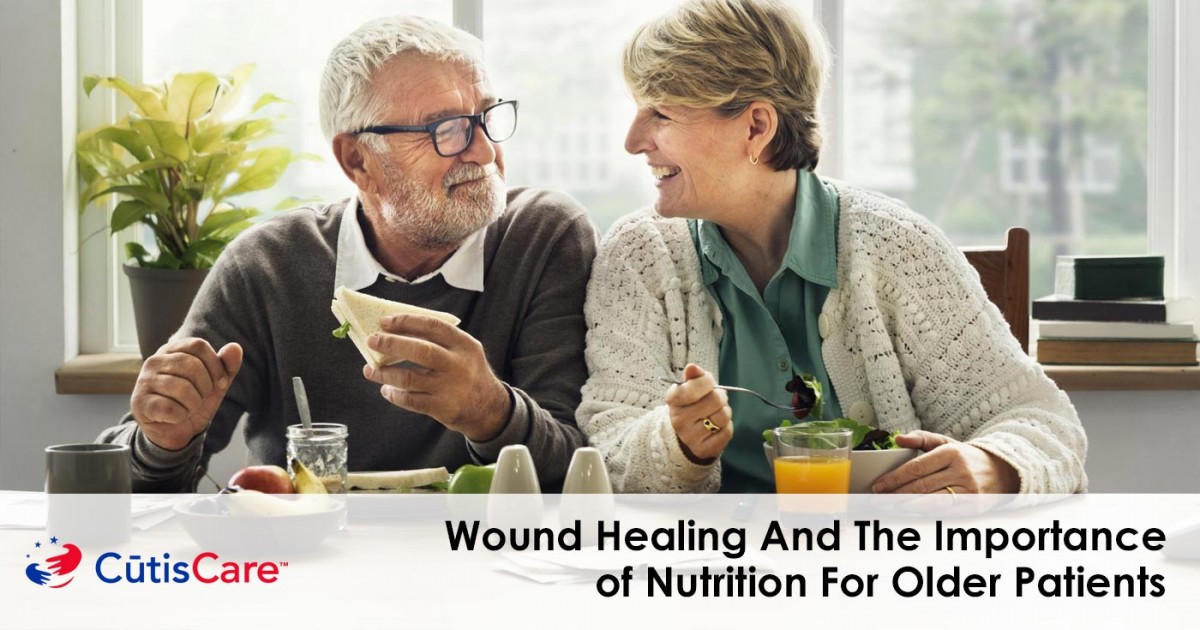Wound Healing And The Importance of Nutrition For Older Patients

Wound Healing And The Importance of Nutrition For Older Patients
Reading Time: 3 minutes
There are many important factors that affect successful wound care management, but perhaps none are as important as nutrition. Nutrition is especially critical for older patients with wounds that are healing. Medical facilities with a consistent elderly patient population must focus on diet as part of wound care management.
Why is Nutrition So Important in Wound Care?
For wound healing, patients must increase their intake of energy because of the body’s metabolic demand. Many nutrients have specific roles in wound healing. Healthy skin requires sufficient nourishment to maintain its integrity. Patients with wounds that don’t receive proper nutrition experience delays in wound healing.
Compromised respiratory, immune, and circulatory systems often delay wound healing and complicate the process. Even healthy elderly adults require more protein than younger people. Older patients with wounds need 1.5 grams of protein for every kilogram of their body weight.
Older people have a harder time meeting their nutritional requirements because they find it more difficult to intake enough calories for various reasons. Older people often intake even fewer nutrients when they are ill or injured. Many medical facilities have undertaken studies to compare their menu’s nutritional value compared to the necessary nutrient intake recommendations for wound care. The results were surprising. Many clinical setting menus didn’t provide enough zinc or energy to meet dietary requirements for wounds to heal well.
Factors that Impact Malnutrition in Elderly People
The elderly face many internal and external limitations that contribute to their malnutrition. They include:
-
Physical Limitations
Older people may have arthritis that makes it difficult to prepare food or cut it up. It also affects their ability to go grocery shopping for food.
-
Slow Gastrointestinal Tract
As we age, our gastrointestinal system slows down meaning that patients can’t absorb enough minerals, protein, and vitamins from their food even if they are eating right.
-
Taste Changes
Seniors tend to take more medications, and this can affect their perception of taste and decrease a patient’s appetite.
-
Dental and Mouth Problems
Dental problems can significantly affect the types of food that an older person can eat. Meat that provides a lot of protein may be difficult to chew. Protein powders or products like Ensure can supplement protein in a patient’s diet. It’s not too expensive and can be added to drinks and certain foods.
-
Income and Medication Cost
Approximately 61% of women and 31% of men over 65 years old subsist on incomes under $10,000 a year. An older patient with many health problems usually has to take many medicines that cost a substantial amount of their budget. Elderly people are often forced to choose between their medications and food.
-
Psychological and Social Factors
Many social and psychological factors affect malnutrition in the elderly. They could have to make a change in living arrangements, live alone, lose a spouse, and more. These problems cause depression in older people, and as a result, they lack interest in eating anymore.
-
Cultural Aspects
Different cultures require specific rituals regarding food preparation, meal service, or blessings. This problem can become a major issue when a person is hospitalized or put in a nursing home. Be considerate of their cultural preferences about food.
-
Chronic Illness
Long-term illnesses and diseases can increase the body’s energy demands and also cause anorexia.
Skin texture also changes as we age, and many factors influence these changes such as nutrition, genetics, the environment, and more, it becomes thinner and tears easily. All of these transformations increase the risk of injury to the skin. It’s critical to consider all of the aspects that we talked about in this article when treating elderly patients with healing wounds.
Nutrition is one of the most important factors that medical facilities can address to help the wound healing process. Meeting the adequate nutritional requirements of older people helps speed up the wound process and reduce the risk of infections.
